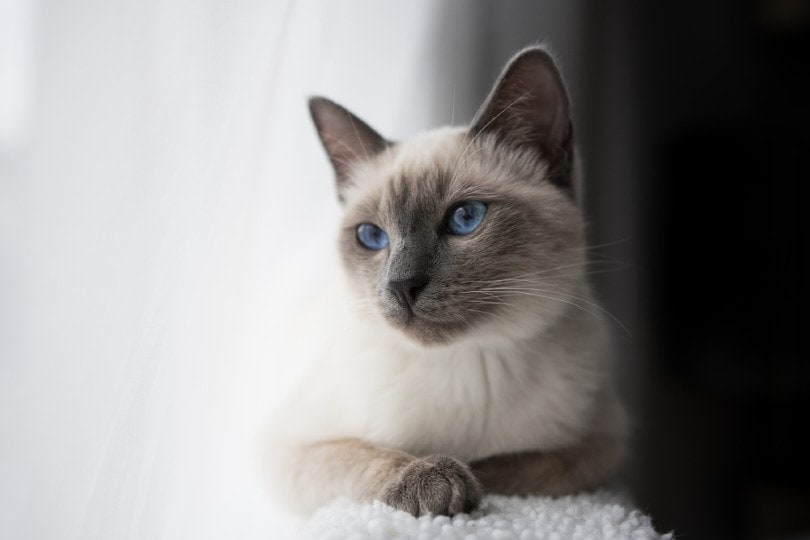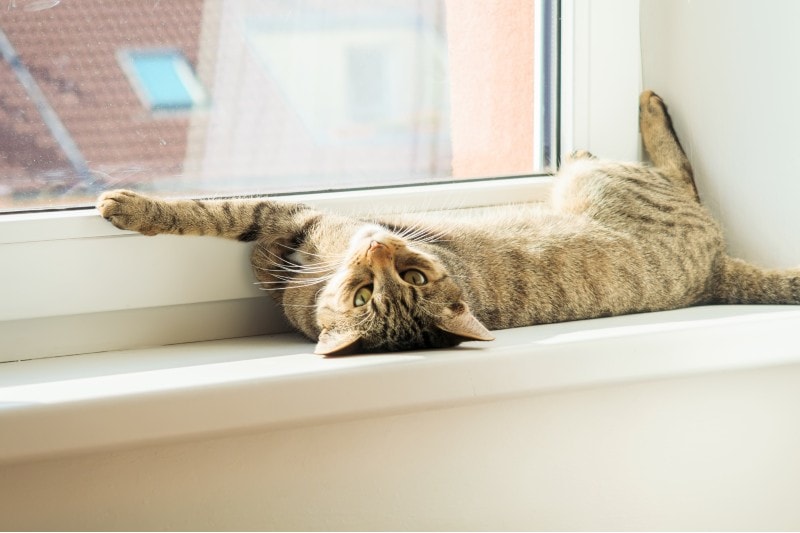Why Is My Cat Spraying in the House? 5 Reasons & How to Stop It

Updated on
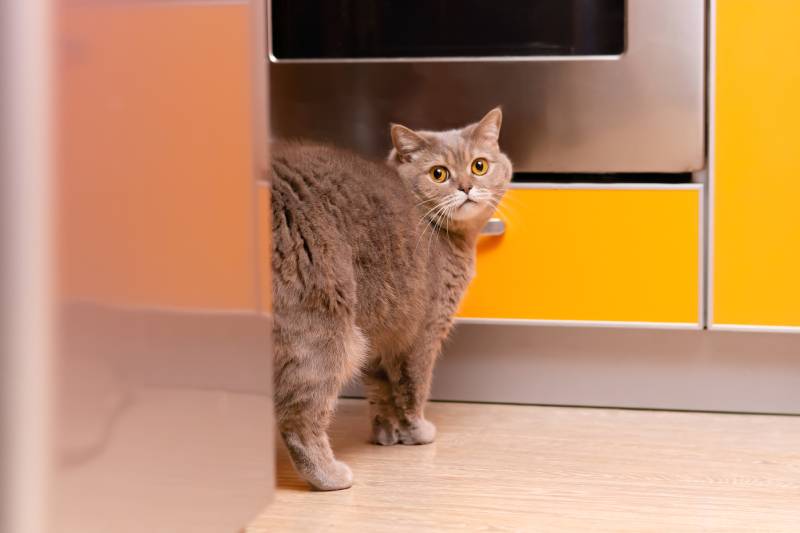
Because cats have been so well domesticated over thousands of years, it can be easy to forget that they are animals. As such, they do still show a lot of behavior that is indicative of wild cats. While it might be natural behavior, in some cases, it does not mean that you want your cat spraying on every surface in the house. And, what’s more, while spraying is natural, it could be an indication that something is stressing or worrying your cat. Below, we look at the most common causes of cat spraying and the ways you can stop it.
What Is Cat Spraying?
Cat spraying is when a cat ejects a small amount of urine on a surface. It is different from accidental urination, as it is usually done intentionally and sees the cat backing up to an object before quivering its tail and then firing a small amount of urine onto a vertical surface. It rarely, but sometimes can, occur on flat surfaces.
The 5 Reasons Why Cats Spray in the House
Cat spray can be smelly. It’s horrible if you accidentally touch it, and it can be incredibly embarrassing if it happens when somebody is visiting. Depending on where the cat sprays, it could also be unhealthy for you and other family members. It is also a natural behavior in cats, although more common with wild cats than domestic, and there are several reasons why your cat might be spraying the furniture and walls.
1. Marking Territory
There are several ways that felines can mark their territory. They have scent glands on their head and neck, as well as their paws. They can also scent an area using urine. The most common reason for a cat to spray in the home is because they are marking their territory. If you have multiple cats at home, or if you have a dog or other animal, this could be the reason that your cat is spraying. Similarly, if another animal recently visited your home, this could be the underlying cause of the problem.
2. Advertising Sexual Availability
Both male and female cats can spray, but it is far more common with male and unneutered cats. They do it to show that they are sexually mature and available, in a bid to try and win a mate. If your young cat is male and has recently started spraying, it could be that it is trying to find a female or attempting to court another cat in your home.
Even if your cat was recently neutered, it may still spray for a little while as its hormone levels change, and in some instances, neutered cats will continue to spray throughout their life, although this is more common if the cat was neutered when it was older rather than as a kitten.
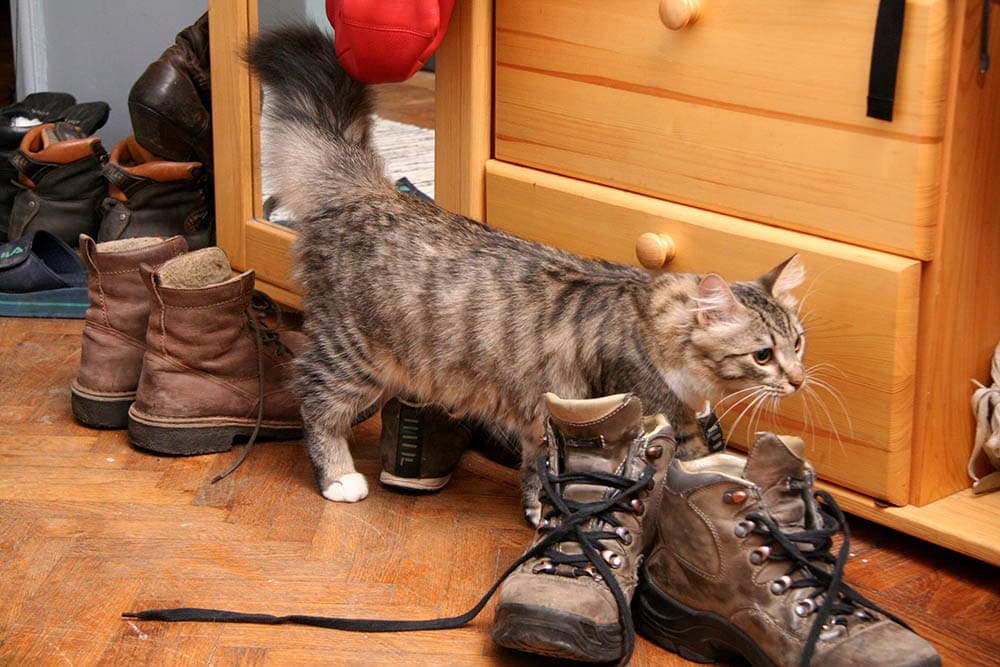
3. Change at Home
Cats, especially indoor cats, are volatile to sudden changes around the house. This can include anything from a new family addition to something as simple as a room being painted. Essentially, the cat determines that there is a new presence in the home and that it doesn’t bear its smell. They spray on whatever has changed to bring parity back to the living environment and make everything feel homely again.
4. Conflict at Home
If you have several cats, or you have dogs and cats, spraying could be a means of trying to show the other animals that the cat is in charge or to warn the other animals off. Not all feline conflict is resolved with claws and hissing.
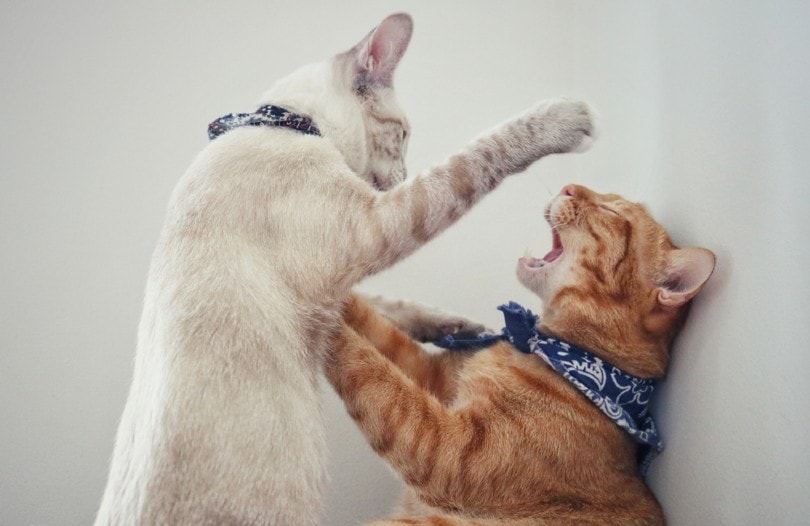
5. Illness
Although spraying usually refers to the act of intentionally spraying up against vertical surfaces, it can also refer to small incidents of urination on horizontal surfaces. If this does happen, you should check to ensure that your cat is not unwell. Some stomach and even some mental problems can cause unwanted spraying and shouting at your cat may only exacerbate the situation and make the spraying worse.
 How to Stop Spraying
How to Stop Spraying
Spraying is a nuisance. It can leave your house smelling of cat urine and it’s especially unpleasant if you touch or sit on wet patches. If your cat is spraying, try to determine the cause, and follow these guidelines to help prevent it from being a problem in the future.
Remove Causes of Conflict
We’re not suggesting getting rid of one of your cats, but if there is a particular time when your household animals are fighting or squaring off, try to prevent these incidents. It might be that you need to move your cat’s litter tray to prevent the dog from eating the litter, which can lead to spraying.
Avoid Major Changes
We all need to redecorate and make other changes to the house, but if you are overly concerned about spraying because your cat has a history of doing so, try to make changes gradually. If you are moving house or redecorating, put litter trays and your cat’s toys and beds in the room that are changing. They carry your cat’s smell, which may be enough to prevent the need to spray.
Get Your Cat Neutered
In most cases, cats that spray are unneutered males. Getting your kitten neutered could prevent them from spraying in the future, but it is worth noting that this isn’t a failsafe preventative measure. Some neutered cats continue to spray throughout their lives, while most will continue to spray for a few weeks or even months after the procedure, as hormone levels normalize.
Consult a Vet
Illness could be causing your cat to spray or could be leading to unwanted urination. In this case, you need to determine the illness and treat your cat to prevent it from happening again. Try to determine when and where it happens, consult a vet, and follow their recommendations to help stop the problem.
Use Pheromone Products
If spraying is being caused by anxiety or worry, there are pheromone-based products on the market that aim to calm your cat and therefore prevent unwanted spraying. These usually take the form of a spray bottle, and you can mist your home, but there are also supplements and even some foods that claim to stop cats from spraying. You may have to try a few products to find the one that works best for you and your cat.
 Why Cats Spray in the House
Why Cats Spray in the House
There are several possible causes of cat spraying, but the biggest is linked to a cat feeling threatened in some way. They mark their territory as a means of showing other cats and other animals that they are the boss and are in charge. Specific causes may include hostility with other cats, anxiety caused by another cat or dog visiting the house, or even illness. Try to determine the cause of the spraying and then take steps to prevent it, to ensure a better life for you and your cat.
Related Read:
- 9 Best Cat Urine & Odor Removers (Enzyme Cleaners) – Reviews and Top Picks
- 9 Best High-Sided Litter Boxes for High Spraying Cats – Reviews & Top Picks
Featured Image Credit: Evgeny Haritonov, Shutterstock

 How to Stop Spraying
How to Stop Spraying
 Why Cats Spray in the House
Why Cats Spray in the House